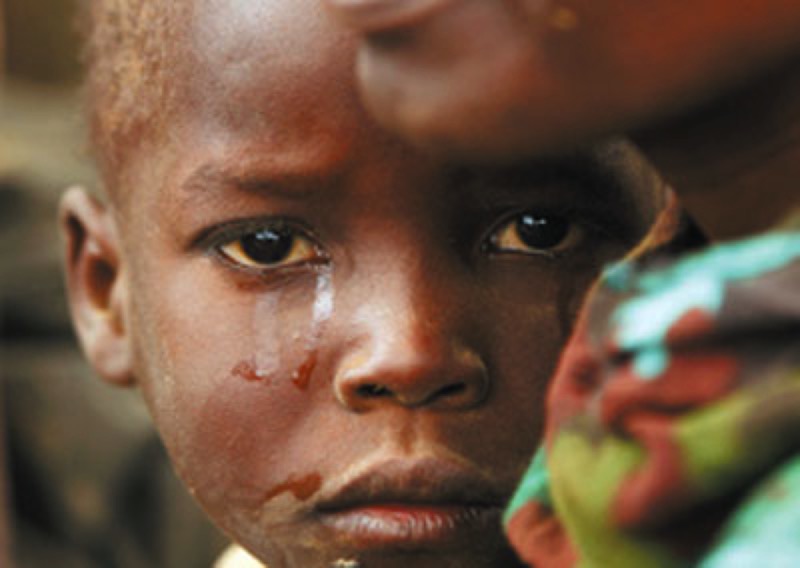Africa struggles to Control prolific killer
Death toll from the disease is expected to rise above those of malaria and HIV by 2030, writes Katrina Manson
By Katrina Manson in Nairobi | Financial Times | September 16, 2011
Read Original

Diabetes — At his weekly gentlemen's club in a village not far from the Kenyan capital, Francis Marimbe Mwathi gathers his friends to dine on "the meat of men". Washed down with a few beers, it is hardly the health-conscious diet his doctors advise.
Mr. Mwathi has diabetes. Already his eyesight is failing, and his joints and feet are so swollen he shuffles with a walking stick. Protein in his urine indicates his kidneys are not functioning well.
The 68-year-old has reduced his sugar intake and digs up vegetables for exercise, but baulks at relinquishing every indulgence. "You mean white meat," clarifies Dr. Kirtida Acharya hopefully during a consultation.
"No, nyama choma [roast red meat], our best food," he says, stiffening with pride. "If there is no nyama choma, there is no food."
Lifestyle influenced non-communicable diseases [NCD], including diabetes, heart disease and cancer, kill about 36m people each year — 80 per cent of them in developing countries. The rate is growing fastest in Africa, where it will overtake the death toll from infectious diseases such as malaria and HIV by 2030.
Alarmed by the trend, the UN will hold a two-day general assembly devoted to NCDs from Sunday, marking only the second time it has met to discuss a global health crisis since its effort to tackle HIV/Aids in 2001.
Long seen as a disease of the affluent west, diabetes "is actually a disease of the poor", says Dr. Silver Bahendeka, chairman of the International Diabetes Federation Africa region. No country has turned the figures around and, as the case of Mr. Mwathi suggests, changing behaviour will be hard.
Prevalence of diabetes in Kenya is 3.3 per cent — more than 1.3m people — but experts say this is a huge underestimate. Ad hoc screenings in city slums and the arid east suggest one in five has the disease.
"Data have not been properly captured," says Dr. William Maina, head of NCDs at the ministry of health, whose unit has been funded only for the past three years. "Our main concern has been malaria, but we have realised the burden of NCDs has been crawling up silently: about half of hospital admissions and mortality here are NCDs."
Many seek help only when potentially fatal complications emerge, sometimes 15 years after developing the disease.
The World Health Organisation says unhealthy diets, smoking, drinking and inactivity are factors in developing NCDs. In a region used to high-starch diets and regularly affected by drought, many take pride in weight as proof of wealth.
For others, it is a bitter corollary to development as urbanisation takes hold even in rural areas. Some blame the "CocaColaisation" of Kenyan society. Billboards showcase bottles of the sugary drink with the slogan "Open happiness".
"We have an increasingly sedentary lifestyle, everybody is drinking sodas and eating starch and fried fatty snacks in school," says Dr. Acharya, chairman of the Diabetes Kenya Association, who says the disease in children is increasing.
The Kenyan government, which has already restricted public smoking and alcohol consumption, is considering banning adverts for sugary food and drinks near schools and requiring salt and sugar food labelling.
Mindful that donors allot only 3 per cent of $22bn a year in aid to NCDs, Kenya is also developing an NCD strategy and hopes the UN will prioritise such diseases, help bring down drug prices and improve healthcare systems to ensure more regular and sweeping blood sugar level checks.
"The African population has a very high gene for diabetes," says Dr. Bahendeka. "I wish I knew why; I would get a Nobel Prize for that."
FAIR USE NOTICE. This document contains copyrighted material whose use has not been specifically authorized by the copyright owner. The Campaign to Stop Killer Coke is making this article available in our efforts to advance the understanding of corporate accountability, human rights, labor rights, social and environmental justice issues. We believe that this constitutes a 'fair use' of the copyrighted material as provided for in section 107 of the U.S. Copyright Law. If you wish to use this copyrighted material for purposes of your own that go beyond 'fair use,' you must obtain permission from the copyright owner.











